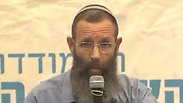
Rabbi Yigal Levinstein. What kind of authority does he have?
Before separating religion from state, separate religion from policy
Op-ed: Rabbi Levinstein can be defined as a anomaly, but the biggest problem is how religion is taking over policy. The State of Israel was established to fulfill the national—not religious—revival of the Jewish people.
Rabbi Yigal Levinstein grew up in the southern resort city of Eilat. According to his own testimony, he was a common brat, a party animal who used to lie on the beach and look for girls. He joined the IDF, served as a combat commander in regular service, became religious and turned into a rabbi and an outstanding educator of many students and army officers.

Several years ago, his righteous wife passed away. Only several weeks later, he married a much younger woman, a widow of one of his students, a hero who was killed in the Second Lebanon War. His community members gossiped.
I don’t even want to think—I won’t dare let it cross my mind—what the religious and Haredi media would have written had this scene taken place in the secular sector in Tel Aviv, God forbid, the city of lewdness and sins, unstoppable immorality, leftist abomination.

Rabbi Levinstein with IDF soldiers. A large and dominant group of rabbis preaching hate (Photo: Bnei David Yeshiva in Eli) (צילום: ישיבת עלי בני דוד)
Every few months, we hear of Levinstein’s sermons and preaching. Last summer, he tongue-lashed the LGBT community, insulting and offending its members. Petitions were organized at the time against him and in his defense. Last week, his comments against female soldiers serving in the army were published. He lashed out against them in full force. He ruled that they were drafted Jewish and were “not Jewish in the end”—in other words, each of these girls is released from the army as a gentile. He recommended preventing their enlistment and marrying them off at the young age of 18-20, while they are still “hot.” What kind of authority does this rabbi have—biblical-halachic, gynecological, meteorological?
Dozens of pre-army academy heads strongly objected to his slander. But within two to three hours, and this is where we should start being concerned, more than 200 officers signed a petition supporting the rabbi and his comments. In other words, there is a network in the IDF—latent yet ready for action—which is attentive to what dark rabbis have to say and is willing to enlist to partake in divine missions.
There is a large and dominant group of rabbis in Israel, which lives off public funds, is known for its blindness and fanaticism and has a strong influence on commanders and soldiers. While they are known as the Yesha rabbis, they are deployed all over the country, from Safed in the north to Eilat in the south. They educate to hate the enemy, and just as much—to hate the other.
The Bible they profess to uphold offers a humane and egalitarian attitude towards the proselyte and the other. The Bible even contains a recipe of tolerance and peace towards the enemy and the city one is forced to fight for. But these rabbis must have been influenced by westerns. One of the greatest westerns is called The Magnificent Seven, and it says that “you gotta hate what you are firing at.”
Rabbi Levinstein himself can somehow be defined as an anomaly. The biggest problem is religion taking over policy. Before separating religion from the state, we must first and foremost separate religion from policy. Israel was established to fulfill the national—not religious—revival of the Jewish people. The Torah protected the people of Israel quite well for 2,000 years. A clear and sober policy should protect the State of Israel. One of the basic goals of the state’s establishment was to take the fate from the hands of God and place it in the hands of man. To place the people of Israel back on the course of history—not on the course of religion, which it was successfully attached to for thousands of years in exile.
In the early 1950s, personal life in Israel was already placed in the hands of the religious, although they were a small minority at the time and are still a minority today. The religious dealers received a generous monopoly over the entire public space, from birth to burial, from marriage to divorce. It was part of a package deal: You run the personal life, while the seculars—from the right and from the left—will run the national life.
The moderate religious people of the historical National Religious Party were succeeded by the people of the Tkuma party and Rabbi Kahane. Over the years, these zealots have been impressively successful, almost as much as the seven-times-worse preachers on the Arab side—Hamas, the Islamic Jihad, etc. And so, since the early 1990s, the Israeli-Palestinian conflict is shrinking, but the Jewish-Muslim conflict is growing stronger.
Amnon Abramovich is a Channel 2 News commentator.










